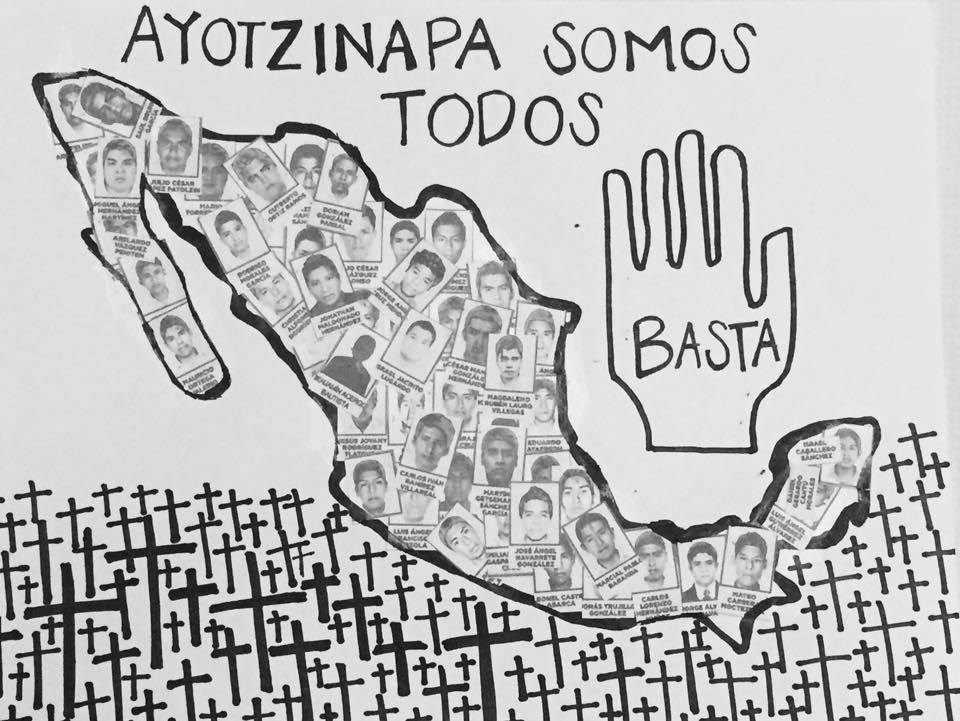Prime Minister Harper’s decision to indefinitely postpone the North American Leaders’ Summit — better known as the annual “Three Amigos” meeting — likely has a lot to do with his own electoral calculus. But it also does Mexican President Peña Nieto a huge favour.
The Canadian media has speculated that Harper delayed the meeting because of tensions with the U.S. over the Keystone XL pipeline. But it has ignored how Peña Nieto is currently facing the biggest political crisis of his administration as a result of the forced disappearance of 43 students from the rural teachers’ college Raul Isidro Burgos in Ayotzinapa, and the murder of six others, on the night of September 26 in Iguala, Guerrero.
For the last four months, the forced disappearance of the students from Ayotzinapa has moved hundreds of thousands of Mexicans to take to the streets over and over again.
The continuing protests have expressed sadness, not just for the six dead and 43 missing, but for the more than 150,000 dead and 22,000 missing since the start of the proclaimed war against organized crime and drug trafficking. “Alive they were taken, alive we want them back” is the constant refrain, as demonstrators also express rage at widespread impunity and corruption in the face of a situation that exposes state collusion with organized crime in Mexico.
In response to the crisis, Peña Nieto’s government first waffled about the need for federal involvement in the investigation in Iguala, and has repeatedly tried to wash its hands of the situation with callous announcements that the students are all dead and burned, and their DNA cannot be traced.
But the Mexican government’s explanation, that municipal police, acting under orders of the local mayor, are entirely responsible for the forced disappearance of the students and their delivery to a group of narcos who claim to have burned them in the Cocula garbage dump, has never been believed by the surviving students or their parents.
On the contrary, this story is falling apart.
Investigative journalists working with the UC Berkeley’s Investigative Reporting Program and Proceso magazine have found that the federal government’s claim that the municipal police and Iguala mayor are solely to blame for these disappearances is dubious at best. They report, on the basis of official documents and testimonies from police, the mayor, and detainees, that key witnesses were tortured, putting the federal government’s version in doubt. They also report that federal police and army officers were tracking the students’ movements on September 26, were present at the scene, and may be directly implicated in the murder and forced disappearance of the students. However, when investigators sought to search federal police stations and army barracks for the students, they were denied entry.
Additionally, Mexican scientists at the National Autonomous University of Mexico (UNAM) have further determined that it is impossible that 43 bodies could have been burned at the Cocula garbage dump given the amount of fuel it would require. They urge an investigation of private and state-owned incinerators.
This is news that is top of mind daily in Mexico right now.
When Peña Nieto visited President Obama in Washington on January 6, he could not escape the crisis. The visit was supposed to address immigration reform and economic issues, but was overshadowed by public demonstrations and media commentary about the Ayotzinapa murders and disappearances. Hundreds of Mexicans from all over the United States, from as far away as Los Angeles, protested his visit with shouts of “assassin.” Obama also publicly called Ayotzinapa an “outrageous tragedy,” although he fell short of condemning the Mexican government’s handling and cover up of the case.
In contrast, Harper and his government have not once spoken out about the horror of what took place on September 26 and the terrifying conditions that make it possible for 43 students — and so many others –to be brutally killed or disappeared.
Harper’s silence and the postponed summit are surely welcome for Peña Nieto. Further to this, the quiet complacency with which Harper and his government are treating implications of state collusion with organized crime and armed forces in torture, forced disapearances, and murder in Mexico avoids crucial questions over how NAFTA-fuelled Canadian business may be implicated.
Mexico is the top destination for Canadian mining investment outside of Canada, with nearly 200 Canadian mining companies operating in Mexico. This includes Goldcorp’s highly profitable “Los Filos” open-pit gold mine, located a short distance from Iguala, Guerrero. Other companies, such as Minaurum Gold, Torex Gold, and Newstrike Capital have interests in the immediate vicinity. How and at what cost do they operate there when there is currently an all out war between competing criminal groups for control in nearly every municipality in Guerrero, whose business has been shifting to include extortion?
The Canadian government should, at a minimum, join the global cry for full and impartial investigation into the crimes against the students of Ayotzinapa and that everyone implicated — at all levels — be brought to justice. Beyond this, Canada urgently needs a full and impartial investigation of its own about how Canadian economic interests could be fueling or benefitting from this state of terror that is disappearing, murdering, and displacing Mexicans on a daily basis.
“Alive they were taken, alive we want them back.”
Photo credit: Sharon Murillo (http://regeneracion.mx/). Picture by Students of University of Texas, El Paso



